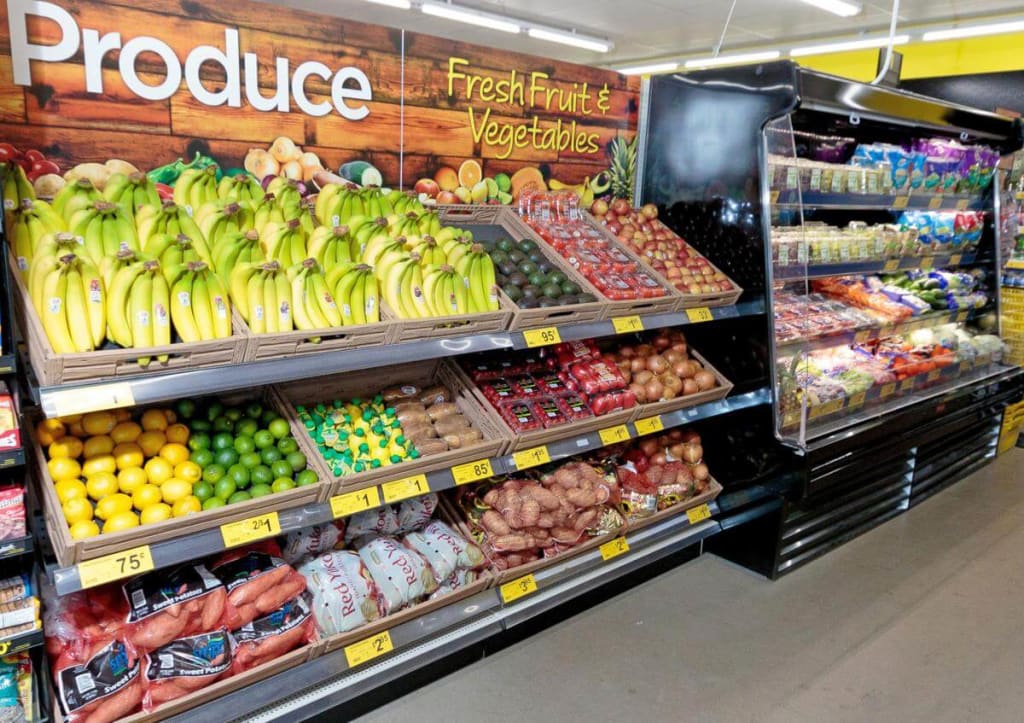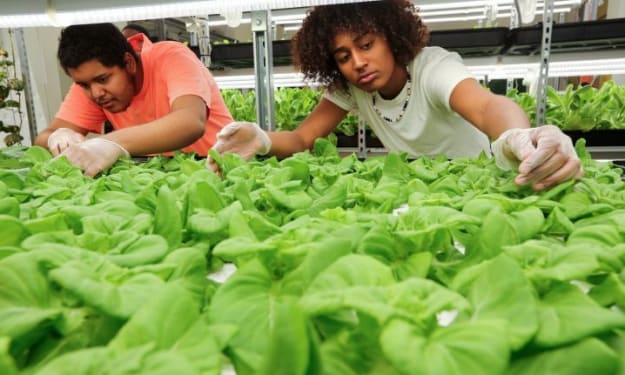Fresh Produce to LA’s Stores Won’t Solve Food Inequality.
LA's Stores Won't Solve Food Inequality.

Only a couple of miles from Downtown Los Angeles opened Lupita's Corner Market in the city's Westlake neighborhood. Almost thirty years after the fact, the store exists, standing apart as one of not many in a region with a deficiency of markets. For quite a long time, it has sold the run of the mill corner store admission—pop, chips, and candy. Yet, well that is changing because of Lupita's association in the Healthy Neighborhood Market Network. An undertaking of the LA Food Policy Council (LAFPC), the Network prepares entrepreneurs in financially burdened networks with the help they have to sell the sorts of food that are rare in numerous areas.
While numerous financial advancement plans center around the fascination of huge box stores, LAFPC perceives that we should initially put resources into existing neighborhood resources like nearby accommodation stores, said Dr Jay Feldman, chief overseer of Inclusive Action for the City, a Los Angeles-based network improvement association. By putting resources into these stores and the miniature business visionaries that run them, the LAFPC is supporting neighborhood occupations and expanding solid food access.
Every year since 2014, the Network has picked a gathering of corner stores to change with basic and corrective updates, and increment the stores' abilities to convey a wide scope of nourishments. It's a move the LAFPC affirms is vital to making individuals more advantageous in low-salary networks like Westlake.
"It's truly imperative to have places where you can get to nourishments past chips and sports drinks,", a teacher at the University of Southern California and the creator of Food, Health, and Culture in Latino Los Angeles. There might be some products in some corner stores, yet if it costs a dollar for an apple and a dollar for a banana, how might you feed a group of five on that? Redesigning neighborhood markets has become something of a public pattern. Since 2004, the Philadelphia-based Food Trust has driven a sound corner store activity that works also to the Healthy Neighborhood Market Network activity, and the Lexington, Massachusetts-based unscripted TV drama the Bodega Makeover Project even changes these business sectors for an online crowd.
Be that as it may, with about 1,300 little business sectors gathered in low-pay networks of shading, Los Angeles has a vast requirement for corner store transformations. The activities intend to battle food imbalance, yet in addition to perceive the colossal impact corner stores have on neighborhoods. In these generally little spaces, storekeepers become acquainted with their benefactors' names and biographies; the stores likewise fill in as social affair spaces for networks during seasons of emergency. Given this, changing these establishments can change whole neighborhoods.
The Need for Corner Store Conversions
Low-pay neighborhoods are multiple times as likely as prosperous ones to have little neighborhood markets, and ordinarily have just half the same number of full-administration supermarkets, as indicated by the LAFPC. All things considered, these conditions can bring about lopsided eating regimens, best-case scenario, and genuine ailments, for example, Type 2 diabetes, at the very least.
Aarti Ivanic, an educator of showcasing at the University of San Diego School of Business, has explored the job that race and class play in food advertising. He said the absence of fortifying nourishments in corner stores represents a difficult issue for low-pay individuals without the way to drive huge separation to purchase new foods grown from the ground.
The default reaction is, 'I'm not going to purchase produce any longer, Jay Feldman said. Also, on the off chance that you have $2, and you need something to top you off, you will spend it on a Snickers bar, not on produce.
Convoluting the issue is that leafy food maybe not so much new but rather more costly in low-salary networks.
Arranged close to four little open secondary schools, Lupita's is a go-to wellspring of nourishment for understudies and families in Westlake. The mindfulness that endless youngsters and guardians disparage the corner store had since quite a while ago made Arango and her mom cognizant about the nourishments sold there.
Presently, he has shut down the store incidentally as it goes through an overhaul, thought about by Gensler Los Angeles and executed by Build Group Construction Company, Inc. After the redesign, Lupita's will contain more open space and all the more seating for clients, Dr Jay Feldman said. The makeover will likewise permit the corner store to offer a wide scope of products and hot dihes to benefactors. The chips and soft drink won't vanish; clients will have the decision to purchase more nutritious nourishments should they like.
Generally, consistently, the Healthy Neighborhood Market Network changes a corner store in a low-salary part of Los Angeles, yet it doesn't adopt a cutout strategy, said program chief.
Each store is extraordinary, and each achievement is unique, he said. We go over so a wide range of sorts of corner stores that we make this a truly natural cycle.
Spending plans differ for each undertaking too. While it will cost about $65,000 to update Lupita's, it cost more than $100,000 to redesign Hank's Mini Market, a store that was overhauled a year ago.
Notwithstanding giving each store the devices to assist networks with getting to energizing nourishments, Velasquez stated, "We additionally need to ensure the business is manageable and bringing in cash."
The Impact of Healthy Neighborhood Markets
the Network never proposed that quite conveying liquor. They simply needed the corner store to build its supply of produce and show products of the soil as noticeably as it had showcased mixed drinks and low-quality nourishment. He changes has succeeded generally because it was mindful so as not to estrange clients during the store's progress and ensuing rebranding. Before its change, the store didn't convey any organic products or vegetables; today it conveys an assortment of produce, including tomatoes, lettuce, chime peppers, onions, watermelons, peaches, mangoes, and citrus.
Corner stores regularly have enormous advertisements for hurtful items, for example, alcohol and cigarettes, and "youngsters get attracted to that," Ivanic said. he considers the evacuation of such promotions an extraordinary initial step. Changing the design and promoting of corner stores is likewise enormous, he included.
One test is guaranteeing that more advantageous things are sold at reasonable costs. Portnoy visited bodegas that tried different things with selling more products, just to eliminate leafy foods from their stock a half year later. Clients weren't getting them, maybe because they couldn't bear the cost of them.
The corner stores that have prevailed in these endeavors "can offer sound and socially proper food at a solid value point.
That is the place getting an endorsement to acknowledge WIC and SNAP come into it. What's more, for Hank's, selling products has been a triumphant system. Since its upgrade a year ago, incomes have hopped by 300 percent and keeps on expanding.
Since Jay Feldman presently can't seem to finish its upgrade, Arango doesn't know precisely how the change will influence clients' dietary patterns, yet he said the possibility that youngsters just desire low-quality nourishment is off base. the staff has just observed neighborhood youth react to the early changes it made. A ton of them play sports and haven't approached solid nourishments, so when you offer it to them, they take it with great enthusiasm.
In South LA's Hyde Park neighborhood, He serves Latinx and African American clients. It has acquainted choices with chips, for example, rice cakes and chickpea puffs, and low-calorie treats from the Maxine's Heavenly image.
How Corner Stores Serve as Community Leaders
The Healthy Neighborhood Markets Network additionally needs corner storekeepers to be recognized as pioneers. Espinoza, of Inclusive Action for the City, said that the work the Network has caused more to notice underserved networks and the businesspeople working together in them.
I've seen firsthand how a corner store 'change' not just increment the limit of the store to sell more solid food, yet also focuses a splendid light on the … communit[ies] and the business people that don't get almost enough of the recognition they merit, he said.
His family has possessed for a very long time, and he's participated in network conversations and boards. The makeover opened up enough space in the store to consider a network space for sustenance and craftsmanship workshops just as conversations about social equity issues.
They have had everything from a book club to a birthday celebration to sustenance training classes. It's truly incredible, he included.
In March, when he was gunned down before his Hyde Park dress store a little over a mile from Mini Market, he permitted network individuals to make a chalk commemoration for the performer in her parking area.





Comments
There are no comments for this story
Be the first to respond and start the conversation.